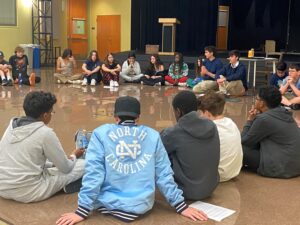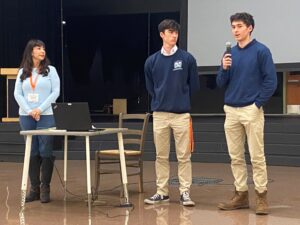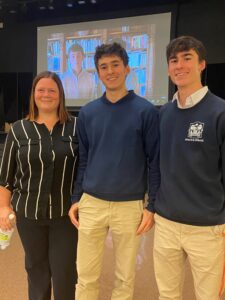Growing up, I was obsessed with the history of the Holocaust and read memoirs and novels prolifically, among them The Diary of Anne Frank to Night to Summer of My German Solider. As a Jew, learning about the Holocaust was deeply entwined with and informed my identity and taught me early about the dire consequences that could result in being “othered” based on one’s ancestors, identity, and beliefs.
I’m certain this early exposure prompted my interest in psychology and education. Immersing myself in stories helped. Since my childhood and adolescence in the 1970s and ‘80s, Holocaust narratives—novels, memoirs, biographies—have proliferated. Myriad perspectives and accounts have the power to inform the next generations of children and teens about the atrocities of Nazi Germany beyond the first-person documented accounts of survivors.
 It’s common knowledge that stories have the power to immerse us into experiences that differ from our own and to transport us into new territory; more incredibly, stories have the capability of building relationships. Uri Hasson, professor of psychology and neuroscience at Princeton University, has found that as we hear stories, our brain waves synchronize with those of the storyteller to deeply capture “the meaning, the situation, the schema—the context of the world.”
It’s common knowledge that stories have the power to immerse us into experiences that differ from our own and to transport us into new territory; more incredibly, stories have the capability of building relationships. Uri Hasson, professor of psychology and neuroscience at Princeton University, has found that as we hear stories, our brain waves synchronize with those of the storyteller to deeply capture “the meaning, the situation, the schema—the context of the world.”
Becoming absorbed in another person’s “context” activates brain regions associated with understanding and predicting others’ motives, which allows us to see a situation from multiple perspectives and can even shift our deeply held values or beliefs when we leave the story’s context and reenter our own.
Last week was Holocaust Remembrance Day, and we honor it solemnly in the backdrop of rising anti-Semitism. The slogan “Never Again” has been associated with the Holocaust; today, more than ever before, we need to insist upon it. As author Daphne Kalotay noted in a recent Guest Essay in The New York Times: “Recent surveys by the Pew Research Center, the American Jewish Committee, and the Claims Conference reveal a shocking lack of knowledge across all age groups regarding the Holocaust.” A 2022 U.S. survey by the Anti-Defamation League found “widespread belief in anti-Jewish tropes, at rates unseen for decades.”
Given these statistics, we can surmise that over the past 60-70 years, hearing directly from Holocaust survivors has played a part in preventing anti-Semitic attacks and in defending against denials that the Holocaust even occurred. But as this generation of survivors passes away—those who were children and teenagers during the Holocaust—it’s less likely that children today will hear directly from any survivors.
 We were blessed to have in our Turning Point community Eva Hecht, grandmother of alumni David, Daniel, and Avital Dumontet—a Holocaust survivor who shared her story with Turning Point students over the years, even into her 90s. (As recently as last year, my son, Miles, and I were invited to hear Eva tell her story to Avital’s bat mitzvah cohort, for which I am grateful.)
We were blessed to have in our Turning Point community Eva Hecht, grandmother of alumni David, Daniel, and Avital Dumontet—a Holocaust survivor who shared her story with Turning Point students over the years, even into her 90s. (As recently as last year, my son, Miles, and I were invited to hear Eva tell her story to Avital’s bat mitzvah cohort, for which I am grateful.)
But Eva died last year only a few weeks before she was scheduled to speak with our Grade 7 and 8 students. Not only did I grieve for the Dumontet family’s loss, but I mourned the loss of a powerful truthteller who dedicated her life to educating young people about the resilience humans can muster to build a meaningful, loving, purposeful life after experiencing unimaginable horrors. An additional legacy of Eva and Emil was their endowment of the Emil and Eva Hecht Chair at the University of Denver’s Center for Judaic Studies.
As time passes, second- and third-generation storytellers are picking up the mantle and finding ways to connect with a new generation of young people. While students learn about the Holocaust in Humanities classes, family memories and personal accounts strike at the heart of the matter with power and urgency.
 As a community of learners and citizens, we were inspired to hear from Eva’s grandsons, Daniel and David (currently 11th graders at Campbell Hall), who spoke to our Grade 7 and Grade 8 students last week. David and Daniel screened a documentary they have produced featuring their grandmother’s experiences and testimonies about the Holocaust and about the fulfilling life of purpose and civic duty that she and their grandfather, Emil (also a Holocaust survivor), created for themselves and their family when they settled in Denver after a decade of living as refugees. David and Daniel are bearing the responsibility of sharing their grandparents’ stories in their own quest to make the world a more just, equitable place and to encourage hopeful ways to respond to despair and pain.
As a community of learners and citizens, we were inspired to hear from Eva’s grandsons, Daniel and David (currently 11th graders at Campbell Hall), who spoke to our Grade 7 and Grade 8 students last week. David and Daniel screened a documentary they have produced featuring their grandmother’s experiences and testimonies about the Holocaust and about the fulfilling life of purpose and civic duty that she and their grandfather, Emil (also a Holocaust survivor), created for themselves and their family when they settled in Denver after a decade of living as refugees. David and Daniel are bearing the responsibility of sharing their grandparents’ stories in their own quest to make the world a more just, equitable place and to encourage hopeful ways to respond to despair and pain.
I can think of no more fitting way to honor Holocaust Remembrance Day than to be immersed in this intergenerational project, to hear about one family’s experience and the determination it has inspired for the next generation to make a difference in people’s lives. I’m humbled by the power one family, even one person, can have to create a beacon of light that attracts others to actively resist what Elie Wiesel calls the “glorification of base, ugly, dark violence.”
As we know, the Holocaust was not the last example of genocide or violence directed at scapegoated groups. David and Daniel remind us that we have the power, the responsibility, and most hopefully, the ability to raise our children with a deep, unyielding commitment to democracy, human rights, and care for other living beings in our world.
Warmly,
Laura
Dr. Laura Konigsberg
Head of School
lkonigsberg@turningpointschool.org


































